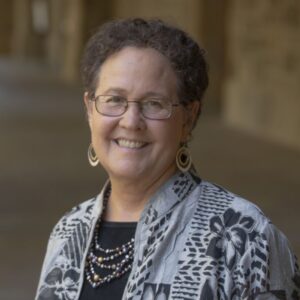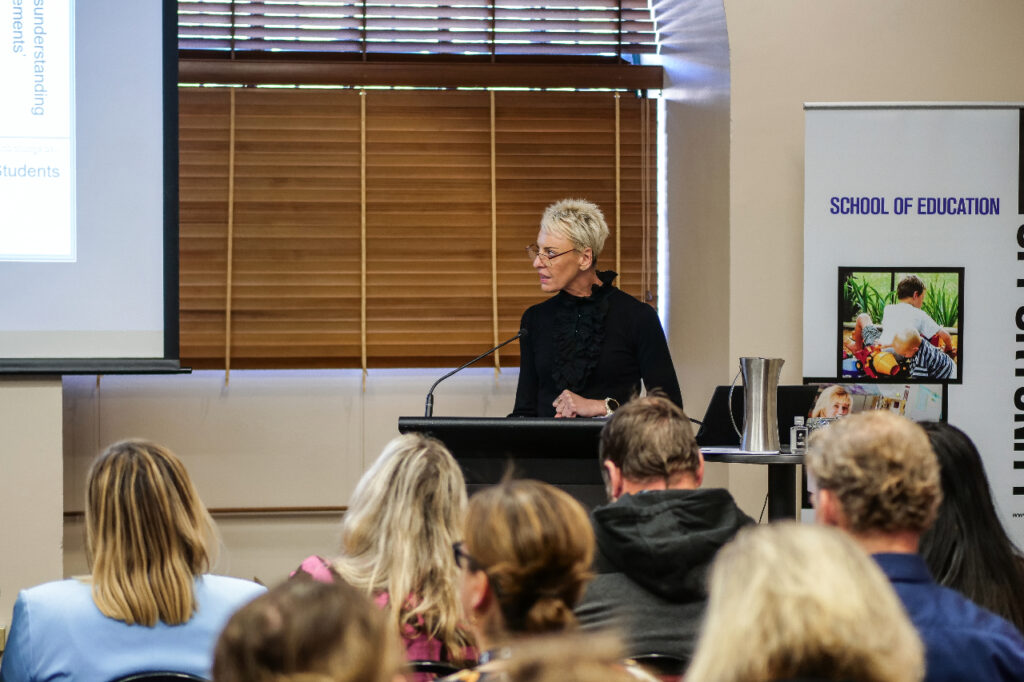A note about the conference dates
QTiP25 is being held during the July school holidays. This is the first time we have scheduled this event during school holidays.
We recognise teachers need time to rejuvenate from a long school term and plan for the term ahead. But we’ve also heard from teachers and school leaders that it’s difficult to take time away from classes. This is especially true since the teacher shortage has worsened and for those from schools in regional areas or wishing to attend QTiP from interstate.
We hope this change makes it easier for many of you to attend and we are open to hearing your feedback.
Download the QTiP25 agenda
Keynote

Professor of Education Emeritus at Stanford University
President and CEO of the Learning Policy Institute
Linda Darling-Hammond is the Charles E. Ducommun Professor of Education Emeritus at Stanford University and founding president of the Learning Policy Institute, created to provide high-quality research for policies that enable equitable and empowering education for each and every child. At Stanford she founded the Stanford Center for Opportunity Policy in Education and served as faculty sponsor for the Stanford Teacher Education Program, which she helped to redesign.
Keynote

Experienced educator
Author of Understanding by Design
Jay McTighe brings a wealth of experience developed during a rich and varied career in education. He served as director of the Maryland Assessment Consortium, a state collaboration of school districts working together to develop and share formative performance assessments. Prior to this position, Jay was involved with school improvement projects at the Maryland State Department of Education where he helped lead Maryland’s standards-based reforms, including the development of performance-based statewide assessments. He also directed the development of the Instructional Framework, a multimedia database on teaching.
Jenny Gore
Laureate Professor, School of Education University of Newcastle
Director of the Teachers and Teaching Research Centre, University of Newcastle

Jenny Gore
Laureate Professor Jenny Gore AM began her career in education as a secondary physical education teacher in South Australia. Since 1992, Jenny has been awarded 102 grants for a total of more than $34 million in research funding. Her educational and research interests have consistently centred on quality and equity, and have ranged across topics such as teacher socialisation, alternative pedagogy, power relations in teaching, reform in teacher education, pedagogical reform, and teacher development. Her career to date has been dedicated to improving the quality of teaching by empowering teachers to enrich student learning.
Alice Leung
Head Teacher Secondary Studies, Concord High School
NSW Teachers Federation Representative

Alice Leung
Empowering students to become ethical and critical learners in the age of AI
This interactive workshop is designed to deepen your understanding of the impacts of generative AI in primary and secondary classrooms. Dive into the latest research on how students engage with generative AI and the techniques teachers use to guide them. Drawing on the Australian Framework for Generative AI in Schools and the Quality Teaching Model, we will collaboratively explore practical scenarios that challenge our understanding of the ethical and critical uses of AI. You will leave with ready-to-use, editable resources to empower your students to become ethical and critical learners.
Steve Grant
Mindsets that matter: Educating with purpose in the age of AI
As we see generative AI continuing to disrupt education, what are the mindsets that matter, that will see educators and learners adapt with purpose? This session explores the inner workings of large language models alongside the outer implications for assessment, reporting, and educational equity. Woven through is a personal reflection on navigating technological change across time and context. Rather than reacting to disruption, we’ll explore how schools and educators can respond with clarity, strategy, and care — and what it takes to preserve the human core of education in an increasingly automated world.
John Lester
Emeritus Professor, Wollotuka Institute University of Newcastle
Indigenous education trailblazer

John Lester
Quality Teaching in black and white: The critical costs of genuine institutionalized failure in Aboriginal education
An old black educational warrior (with near 50 years leadership across all educational levels) supported by his doctoral findings, reflects on the lost opportunity of the Third Dimension of QT for Aboriginal and Non-Aboriginal students and its dire implications educationally and for social justice in NSW. The presentation also lights a small candle of hope for the future, founded on the principles of QT, in an action case study in a typical urban school.
Penny Jane Burke
UNESCO Chair in Equity, Social Justice and Higher Education and Global Innovation Chair of Equity, University of Newcastle
Director, Centre of Excellence for Equity in Higher Education, University of Newcastle

Penny Jane Burke
Mobilising pedagogical methodologies for equity, social and gender justice
Aiming to ignite our pedagogical re/imaginations of the purpose of education, I trouble mainstream discourses of equity entrenched in one-dimensional, deficit discourses. Setting out the collaborative agenda of the UNESCO Chair in Equity, Social Justice and Higher Education, I present our multidimensional framework for transformative equity praxis and introduce the conceptual tools of pedagogical methodologies.
The UNESCO Chair advocates for resisting the quick jump to method as has become part of the institutional machinery of producing evidence to measure the impact of equity interventions through utilitarian logics. Instead, the UNESCO Chair articulates a pedagogical framework for developing communities of praxis and for mobilising collective advocacy and agency. A case study of the Gender Justice Hub is introduced to explore the power of education in the fight against gender-based violence (GBV) and to consider the possibilities of pedagogical response-abilities underpinned by an ethics of care.
Drew Miller
Senior Lecturer, School of Education, University of Newcastle
Deputy Director of the Teachers and Teaching Research Centre, University of Newcastle

Drew Miller
Where the magic happens: A deep dive into the relationship between Quality Teaching and student achievement
It is often assumed that enhanced teaching quality is the way professional development influences student achievement, but this has rarely been explored. Quality Teaching Rounds (QTR) is one of few approaches to provide evidence of impact on teaching quality and student achievement.
Using data from multiple randomised controlled trials, this presentation unpacks the underlying interconnected relationships among professional development, teaching quality and student achievement, examining:
- changes in teaching practice that typically occur through involvement in QTR; and
- how Quality Teaching practices are related to student achievement.
Additionally, this presentation highlights how Quality Teaching aligns with the current industry focus on explicit instruction and can supported by the concepts of cognitive science.
Angela Falkenberg
From surviving to thriving: The pedagogy of belonging
This presentation explores the critical role of belonging in student learning, positioning it as foundational pedagogy rather than peripheral care. Grounded in Maslow’s Hierarchy of Needs, it highlights how intentional teaching, through safe environments and strong teacher-student relationships, creates the conditions for engagement and achievement. As traditional sources of belonging diminish, schools must step in.
Participants will reflect on how classroom practices either foster or fracture belonging and learn actionable strategies to support psychological safety. By prioritising connection before curriculum, educators can build inclusive, high-performing classrooms where every child feels safe, valued, and ready to learn.
Andy Mison
President, Australian Secondary Principals’ Association
Non-Executive Director – Australian Institute for Teaching and School Leadership

Andy Mison
Andy Mison is the President of the Australian Secondary Principals’ Association; the peak body working for the professional interests of Australian secondary principals and the advancement of the school communities they lead.
Sally Larsen
Are Australian students’ assessment results really declining? A holistic interpretation of standardised test data from 1995 to 2022
Standardised tests of academic skills are now a firmly established feature of Australian schooling. Results of NAPLAN and other international assessments, are increasingly used as evaluation evidence and justification for system-wide change. Given the widespread use of test data by schools, systems and governments, it is important that results are interpreted accurately and holistically. This presentation will explore longitudinal data from the four major national and international assessment programs undertaken by Australian students from 1995 to 2022. Rather than patterns of widespread academic decline, taken together test results show patterns of improvement and maintenance, with only one of the four major assessment programs indicating declining results. To conclude, I will outline some considerations for using standardised test results as evidence for recommending changes to teaching practice.
Julie Cowan, Beth Filipo and Kate Shorland
QT Academy, University of Newcastle
A practical introduction to the QT Model and QT Rounds
This 90 minute interactive session is designed to familiarise you with the Quality Teaching (QT) Model as it relates to classroom practice. The QT Advisers will walk you through the Model’s dimensions and elements, ideal for those who haven’t engaged with it for a while or are coming to the Model for the first time. We’ll use an abbreviated form of the Quality Teaching Rounds (QT Rounds) process to analyse a short lesson extract through the lens of the Model. This session offers an intense burst of information while providing a taste of the powerful QT Rounds reflective collaboration that shifts thinking about classroom practice.
Michelle Ware
QT Academy, University of Newcastle
A practical approach to rethinking assessment and learning design through the QT Model
This 60 minute interactive session is ideal for those wanting to know more about embedding the QT Model in assessment practice or learning design. While familiarity with the Model will be useful, anyone seeking to gain valuable insights into collaboratively analysing assessment tasks/activities or programs/units of work through the lens of the Model will find the practical activities relevant. Drawing on the powerful, collaborative QT Rounds process, you’ll experience a taste of how the QT Model supports high quality assessment and programming practice. The processes and concepts addressed are applicable to all grades and subjects. You can choose either assessment or learning design as your focus.
Judy McEwen
Hambledon Public School, NSW
Hambledon Public School: Five years of QTR and going strong
Join us for a presentation on the transformative impact of Quality Teaching Rounds (QTR) at Hambledon Public School over the past five years. This session will detail the implementation of QTR as a professional development strategy to enhance teaching practices and student outcomes. We will discuss initial challenges, collaborative solutions, and key QTR phases such as peer observation and feedback. Highlights include improved student engagement and academic performance, strengthened staff relationships, and a culture of continuous improvement. Discover how Hambledon has leveraged QTR to create a thriving learning community focused on excellence and innovation in education.
Nicole Best, Jennifer Dane and Amy Danckert
Castle Hill High School, NSW
Finding time for QT Assessment Rounds in a large secondary school
In a comprehensive high school with 1,846 students, teachers who facilitated and participated in the Quality Teaching Assessment (QTA) Professional Development and Rounds reflect on their experience with the QTA process. They discuss how their involvement has transformed assessment practices and planning for themselves and their students. The teachers share their honest reactions to the quality of assessment tasks and insights gained, ranging from minor tweaks to fundamental shifts in thinking. They highlight specific strategies informed by the QTA process that have enriched students’ learning experiences, demonstrating the positive impact on teaching methods and potential benefits for student outcomes.
Amanda Rowe and Trish Thompson
Finigan School of Distance Education, NSW
Enhancing online lessons with the Quality Live Lesson Framework
Finigan School of Distance Education delivers online, real-time lessons to students across NSW. To support quality teaching in this unique context, we developed the Quality Live Lesson (QLL) Framework. Drawing inspiration from the principles of the Quality Teaching Model, the QLL Framework supports teachers to reflect on their onscreen presence and delivery through structured video analysis across three domains: Body Language, Voice, and Cognitive Load. Teachers use the framework to peer or self-assess strengths and areas for growth, and to make small, deliberate adjustments that enhance clarity, engagement, and impact in online learning.
Konnie Zagrimanis, Matthew Alterator and Dominique Higgins
NSW Department of Education
Enhancing transitions to close the gap
This presentation will showcase learning community–centred approaches, real-world examples, and culturally responsive practices that promote collaboration, inclusivity, and improved educational outcomes for all students—with a particular focus on Aboriginal and Torres Strait Islander learners. By positioning these strategies as evidence-based best practice, the session highlights their relevance and adaptability across diverse school contexts. Members of the Education Support Team from the NSW Department of Education will share practical approaches and pedagogies that strengthen schools’ capacity to support continuity of learning during the critical transition from primary to high school.
Amy Hall
West Leeming Primary School, WA
Enhancing literacy pedagogy through music
This practical workshop supports early childhood and primary teachers to enhance their literacy pedagogy through the power of music. Drawing on current research, including Dr Anita Collins’ Bigger Better Brains, participants will explore simple, effective musical activities that support phonological awareness and early literacy development—no music background required. Aligned with the Quality Teaching Model, the session promotes intellectual quality, a supportive learning environment, and meaningful learning. Teachers will leave with ready-to-use strategies to engage students in active, joyful learning, leading to improved literacy outcomes, deeper engagement, and stronger language foundations in the early years classroom.
Isabel Clark
Moorebank High School, NSW
The practicalities of a pragmatic implementation of QT Assessment Rounds
In the quest to improve the quality and rigor of our assessment tasks, we piloted the QT Assessment coding process in 2024 with a small group of teachers in a collaborative learning setting, called “Teacher Learning Communities.” Led by an experienced teacher, a group of cross-curricular teachers with diverse levels of experience learnt to code pre-existing tasks, discuss their validity and value in the context of the classroom and school, and adapt their tasks accordingly. Our individual successes prompted engagement with local schools and a plan to implement the coding process on a whole school level in 2025. We will discuss how we balanced the practicalities of innovating assessment on a whole school level, with the rigor and enthusiasm expected with the QT Model philosophy. We will outline our pragmatic approach, share our resources, and describe how we have shared this success with our wider parent and education community.
Simon Miller and Michele McEvoy
Pembroke School, SA
Embedding the QT Model as a schoolwide pedagogical framework
This session will explore our experiences in both adopting and scaling-up Quality Teacher Rounds across an independent ELC-12 school. We’ll show how the success of the program has led to the use of the Quality Teaching Model as a framework to develop a schoolwide shared language and approach to effective teaching, including its incorporation in our newly developed Learning and Caring Framework. We will also share how we have created a resource that allows our teachers to both develop and showcase their practice in relation to the different elements within the QT model, with links to research and teaching approaches.
Beau Berman
Singleton High School, NSW
Curriculum with Purpose: Aligning QTR and UbD for whole-school improvement
At Singleton High School, we are embedding Quality Teaching Rounds (QTR) and the Understanding by Design (UbD) framework as central pillars of our approach to curriculum reform. This presentation will explore how QTR has deepened professional dialogue and built collective efficacy across faculties, while UbD has provided a consistent, student-centred framework for program development aligned with the new syllabuses. Attendees will gain insight into our school-wide implementation strategy, the leadership structures supporting sustained practice, and the impact on teacher clarity and student learning. Practical examples and lessons learned will be shared to support schools on similar improvement journeys.
Tania Jamieson
Independent researcher
The pedagogy of whole language
During the past century, whole language was the dominant method of teaching beginner reading. This session will critically re-examine the theoretical foundations that supported its adoption and provide a structured critique of the supporting research literature.
Cheryl-Anne Stephens
Ministry of Education, Timor-Leste
Building professional learning communities in Basic Education Schools in Timor-Leste
Timor-Leste faces significant educational challenges, including limited access to professional development, varied teacher and school leader competency levels, and the need for inclusive, student-centered pedagogies. In response, my team has worked closely with educators to establish professional learning communities (PLCs) that foster collaboration, reflective practice, and continuous professional growth.
By adapting the DFAT-funded ALMA program (Support Leaders, Teachers, and Learning), an effective cascade training model has been implemented. Deputy principals responsible for teaching and learning are trained to design and deliver pedagogical and instructional leadership training, facilitate PLCs, and coach teachers and school leaders. This approach varies significantly from that of international experts writing training manuals for national trainers to parrot. It ensures the development of efficacy for both leaders and teachers and improved instructional leadership and classroom instruction.
This presentation will explore the strategies used to create and sustain PLCs, highlighting the complexities of modifying a long-standing program that has been in place for eight years. It will address the challenges of shifting from a knowledge-transmission approach—rooted in colonial educational traditions—to a pedagogical model that empowers teachers as active learners and change agents. I will share key lessons from this journey, including strategies that succeeded, those that failed, and how obstacles were overcome.
By sharing my story, I aim to provide valuable insights for educators and policymakers seeking to implement sustainable change, that drive meaningful and lasting improvements in teaching and learning.
Laureate Professor Jenny Gore AM and Dr Sally Patfield
Teachers and Teaching Research Centre, University of Newcastle
Rethinking pedagogy: The central plank in school improvement?
Pedagogy is one of the most ambiguous terms in the field of education: poorly understood, often shunned, and sometimes treated as self-evident. In Australia, pedagogy tends to be used as a synonym for “teaching” and “instruction,” or altogether avoided within political and public dialogue, even though classroom practice is increasingly scrutinised as a key area in need of reform. In this presentation, we argue that how pedagogy is understood, how it is used and misused, and why it is often silenced are fundamental questions with wide-reaching implications for schooling, teaching, and student learning, not only here but also in many other parts of the world. We aim to “rethink” the role of pedagogy in school improvement through three moves: first, an examination of its etymology and definition; second, an analysis of the multiple and contradictory ways it is positioned in scholarship, policy, and practice—and consequences for teachers and the professionalisation of teaching; and third, we explore the potential of treating pedagogy as a central plank in school improvement, anchored in empirical evidence from our own studies of Quality Teaching Rounds.
Michelle Ware
Teachers and Teaching Research Centre, University of Newcastle
QT Assessment Rounds: Supercharging assessment practice and student achievement through professional development
What happens when you conduct Quality Teaching Rounds using an assessment task instead of a lesson? Well, last year, eight NSW primary and secondary schools did just that as part of a pilot study conducted by the Teachers and Teaching Research Centre at the University of Newcastle. The study investigated the impact of QT Assessment Rounds on the quality of assessment tasks and student responses. This presentation shares our exciting findings and provides a brief look at QT Assessment Rounds as a way to strengthen assessment practice and boost the quality of student work.
Dr Patricia Rodie
Dean of Faculty, Education and Humanities
Solomon Islands National University
Culturally inclusive pedagogy in the Solomon Islands context
Dr Patricia Rodie was the former Head of School of Education and Deputy Director of the Solomon Islands College of Higher Education (SICHE) and later the Pro-Vice-Chancellor Academic at SINU before moving on to USP Solomon Islands Campus as Lecturer and later as Campus Director.
Dr Patricia Rodie obtained a Doctor of Philosophy in Education at the University of Waikato, Hamilton, New Zealand in 2011; Master of Education at the Curtin University of Technology, Perth, Australia and; Bachelor of Education at the University of South Pacific, Fiji. Dr Rodie has published several publications in some leading and reputable journals.
Hannah Walker
Syiah Kuala University, Indonsesia
Layers of culture: Opportunities and challenges when implementing QTR beyond Australia
During a trial of QT Rounds in two Indonesian state high schools in Jan-Feb 2024, opportunities for QT to positively impact pedagogy in Indonesia became apparent. Teachers engaged well in the PD, showing individual insightfulness and ability to collectively construct new understandings in the professional learning community discussions. However, various factors, including interrelated national, school, group and individual cultures impacted teachers’ understanding of the material, application of rubrics and readiness to code their peers. Practical solutions are suggested for overcoming cultural barriers during implementation of QT.
Dr Drew Miller
Teachers and Teaching Research Centre, University of Newcastle
Where the magic happens: A deep dive into the relationship between Quality Teaching and student achievement
It is often assumed that enhanced teaching quality is the way professional development influences student achievement, but this has rarely been explored. Quality Teaching Rounds (QTR) is one of few approaches to provide evidence of impact on teaching quality and student achievement.
Using data from multiple randomised controlled trials, this presentation unpacks the underlying interconnected relationships among professional development, teaching quality and student achievement, examining:
- changes in teaching practice that typically occur through involvement in QTR; and
- how Quality Teaching practices are related to student achievement.
Additionally, this presentation highlights how Quality Teaching aligns with the current industry focus on explicit instruction and can supported by the concepts of cognitive science.
Dr Kristina Sincock
Teachers and Teaching Research Centre, University of Newcastle
Little Yarns, Big Dreams: Culture and identity in career education resources
In 2023, we received funding from the National Careers Institute to develop a series of resources to support the career education of First Nations primary school-aged children. The resources were to be informed by our longitudinal research investigating the educational and career aspirations of Australian school students. We also consulted with a panel of Aboriginal and Torres Strait Islander educators, co-designing eight resources to support young people to identify their interests and talents and develop their understanding of educational and career pathways. The resources are freely accessible on yourcareer.gov.au for teachers, parents, community members and other educational stakeholders to download.
Heather Sharp and Elsie Leask
School of Education, University of Newcastle
Reinvigorating pre-service teacher education: Integrating the Quality Teaching Model to enhance learning outcomes
This presentation contributes to professional and academic dialogue surrounding the role of Quality Teaching in initial teacher education programs. We will explore how we successfully integrated Quality Teaching into the reinvigoration of an undergraduate core education course for pre-service History teachers.
In 2024, the course underwent a comprehensive redesign to better support students’ professional and academic development, particularly within the context of subject-specialty methodologies. As part of this redesign, we established through the new Building Successful Pathways program- a collaborative professional learning alternative to the traditional lecture series.
A key measure of success in the new course design was the integration of experiential learning in collegial contexts. Tutorials were couched around four key questions from the Quality Teaching Model:
- What do I want my students to learn?
- Why does the learning matter?
- What will the student do or produce?
- How well do I expect them to do it?
The redesigned course demonstrated quantitative success, reflected in improved Course Experience Survey ratings—the highest since 2021—and a significant increase in student achievement as well as consistent and measurable increased student attendance.
These results, coupled with positive student feedback, highlight the benefits of embedding the Quality Teaching Model in pre-service education programs. We advocate for similar reinvigoration efforts to enhance learning environments in teacher education, with the potential for these benefits to extend into school settings.
Dr Matt Harper
Teachers and Teaching Research Centre, University of Newcastle
Student direction in the classroom: Exploring approaches to teaching and assessment
This study explores classrooms as key sites for participating in democracy. Specifically, I draw on data from a case study involving Year 11 mathematics and Year 11 drama – situated at one government school in NSW, Australia. Using the QT Model, I analysed teaching across topics in both classes and the related assessments. Using interviews and focus groups, I also examined the teachers’ pedagogical approaches and students’ perspectives on their learning experiences. My analyses found that student direction notably coded higher in drama compared to mathematics, aligning with the teachers’ views on factors enabling or constraining such opportunities. Additionally, drama students became empowered through a specified range of assessment choices, whereas mathematics students felt powerless in navigating the timing of their assessment. These findings underscore benefits of student autonomy but clear differences between diverse subjects.
Dr Anthony Ryan
Teachers and Teaching Research Centre, University of Newcastle
Practical considerations for implementing evidence-based professional development
Many effective interventions have failed due to poor implementation in schools. Recent research has identified the importance of the role of context and the need to develop a holistic approach to implementation to maximise positive outcomes. Adopting the field of Implementation Science as a foundation, this presentation will provide practical considerations to help guide the implementation of evidence based practices in school settings including checklists to assist in the process. The implementation of Quality Teaching Rounds in 119 public schools in New South Wales will be used as an illustrative example.
Michelle Ware
QT Academy, University of Newcastle
Designing units of work in the age of Gen AI
This 30 minute interactive session dips a toe in the Gen AI waters in relation to designing units of work. Whether you’re an old-school purist, an adventurous techy or just plain curious, we’ll take a look at the role of Gen AI in supporting teachers to create high quality units of work. A brief demonstration, focusing on Wiggins and McTighe’s Understanding by Design approach in combination with the Quality Teaching Model, will provide food for thought as well as some useful tips to guide your AI journey. Bring an open mind with a clear idea of the important concepts you’d like your students to grasp in an upcoming unit of work. Let’s have some fun!
Dr Drew Miller
Teachers and Teaching Research Centre, University of Newcastle
School health and burnout: Insights from the QT Pulse survey
The QT Pulse – School Health Longitudinal Survey is a free tool for schools to use in evaluating the impacts of Quality Teaching Rounds professional development, or to simply make culture visible for the purposes of understanding and improving the school environment. Using responses from the first two years of the survey, this presentation examines some of the interesting findings before specifically focusing on Teacher Burnout and its relationship with several key outcomes and behaviours. Ways for schools to engage in strategies in attempting to improve staff burnout are presented.
Dr Leanne Fray
Teachers and Teaching Research Centre, University of Newcastle
Literacy curriculum reform and teacher professionalism: Insights from Australia and New Zealand
Contentious debates in the best way to teach literacy (Torgerson et al., 2019) have led to changes in the way literacy is delivered in primary school classrooms. Yet there has been little to no research which has aimed to understand the changes from the perspective of teachers themselves (Hughson & Hood, 2022; Wylie & Hogden, 2020) and the impact these changes have on teacher professionalism. Drawing on data collected in a mixed method research study involving 20 teachers and school leaders from Australia and 20 teachers and school leaders from New Zealand, in this presentation we examine the impact the implementation of a new literacy syllabus in both countries has on teacher professionalism. In New Zealand, there appeared to be a disparity between policy guidelines and what teachers were told to teach. While in Australia, schools increasingly turned to third party providers to deliver entire literacy sessions through scripted lessons. In both countries, curriculum changes have led to the devaluing of teacher expertise, a reduction in teacher agency with lasting negative impacts on how teachers view themselves as professionals.
Brooke Rosser
Teachers and Teaching Research Centre, University of Newcastle
Rethinking mentoring
Mentoring by experienced colleagues is the core component in many models of early career teacher (ECT) induction, including in AITSL’s (2023) recently revised best practice guidelines. While research underscores the importance of mentors, recent evidence suggests there remains considerable variation in ECT’s mentoring experiences across Australian schools. Furthermore, typical hierarchical mentoring approaches can inadvertently disempower ECTs. We explore the efficacy of an approach to developing ECTs during induction that, instead, positions them as equal to experienced colleagues in a collaborative effort to improve teaching: Quality Teaching Rounds (QTR) (Bowe & Gore, 2017). Drawing on interviews with ECTs, experienced teachers, and school leaders as part of a federally funded project to strengthen school-based induction using QTR, we demonstrate the value of induction approaches that foster non-hierarchical professional collaboration for new and experienced teachers alike. Across careers stages, teachers overwhelmingly appreciated the opportunity to observe, analyse and discuss their own and colleagues’ teaching. Moreover, QTR gave ECTs the rare opportunity to give feedback to senior colleagues which increased their confidence and supported the development of less hierarchical professional relationships that continued following QTR. We argue for rethinking business-as-usual, expert-novice, and one-on-one approaches to mentoring ECTs. While mentors matter, QTR offers a more empowering and efficient form of peer mentoring that quickly boosts ECT’s confidence and professionalism. Moreover, QTR provides beginning and experienced teachers with opportunities to form new relationships, thereby increasing ECT access to support and providing more experienced teachers with opportunities to become role models for the next generation of teachers.
Dr Amy McPherson
Teachers and Teaching Research Centre, University of Newcastle
Codesigning solutions to teaching shortages: Solveathons for local answers
This presentation shares research findings on teacher shortages in hard-to-staff Australian schools, highlighting the complex and far-reaching impacts that extend well beyond filling vacancies. Our research indicates that schools seek greater empowerment, creativity, and context-driven approaches to address this urgent workforce issue. This workshop adopts a research-action approach to collaborate on tangible solutions, moving beyond current initiatives such as financial incentives. Through structured discussion and scenario-based activities, the session aims to codesign actionable, context-sensitive solutions that reflect the realities of schools facing the teacher shortage crisis.
Sponsor prospectus
- When you open the app, you will be presented with a ‘Home’ screen.
- To log in, click the icon of a person in the top right corner on the home screen.
- Enter your email address.
- If you have an account, enter your password.
- If you do not have an account, enter your details and create your account.
- Log in to your account.
- Click the ‘Agenda’ button on the home screen.
- In the top right corner of each agenda session, there will be a ticket icon. Select this icon to save to your schedule (note: you must set up a free account and be logged in to do this).
- From here, you can access and view your schedule by selecting the small arrow in the top right of the page and then select ‘My Event Schedule’.
- If you wish to remove a session from your schedule, click the ticket icon again (note: you may not add overlapping sessions to your schedule).
- Click the ‘Agenda’ button on the home screen.
- Select the presentation you would like to provide feedback on.
- Click the ‘Feedback’ button (beside ‘Content’ under the presentation details).
- Click the purple ‘Continue’ button and enter your feedback by filling out the short survey.
- Click the ‘Feedback’ button on the home page.
- Select ‘Overall conference feedback’.
- Complete the short evaluation survey.
- Click the ‘Maps’ button on the home page.
- Click the purple pins to view rooms.
- Click the red pins to view accessible facilities.






 A key feature of the QTiP conference each year are our school story presentations. Attendees tell us how much they value hearing firsthand the experiences of other teachers and schools, implementing and evaluating QT in their own unique contexts.
A key feature of the QTiP conference each year are our school story presentations. Attendees tell us how much they value hearing firsthand the experiences of other teachers and schools, implementing and evaluating QT in their own unique contexts.



